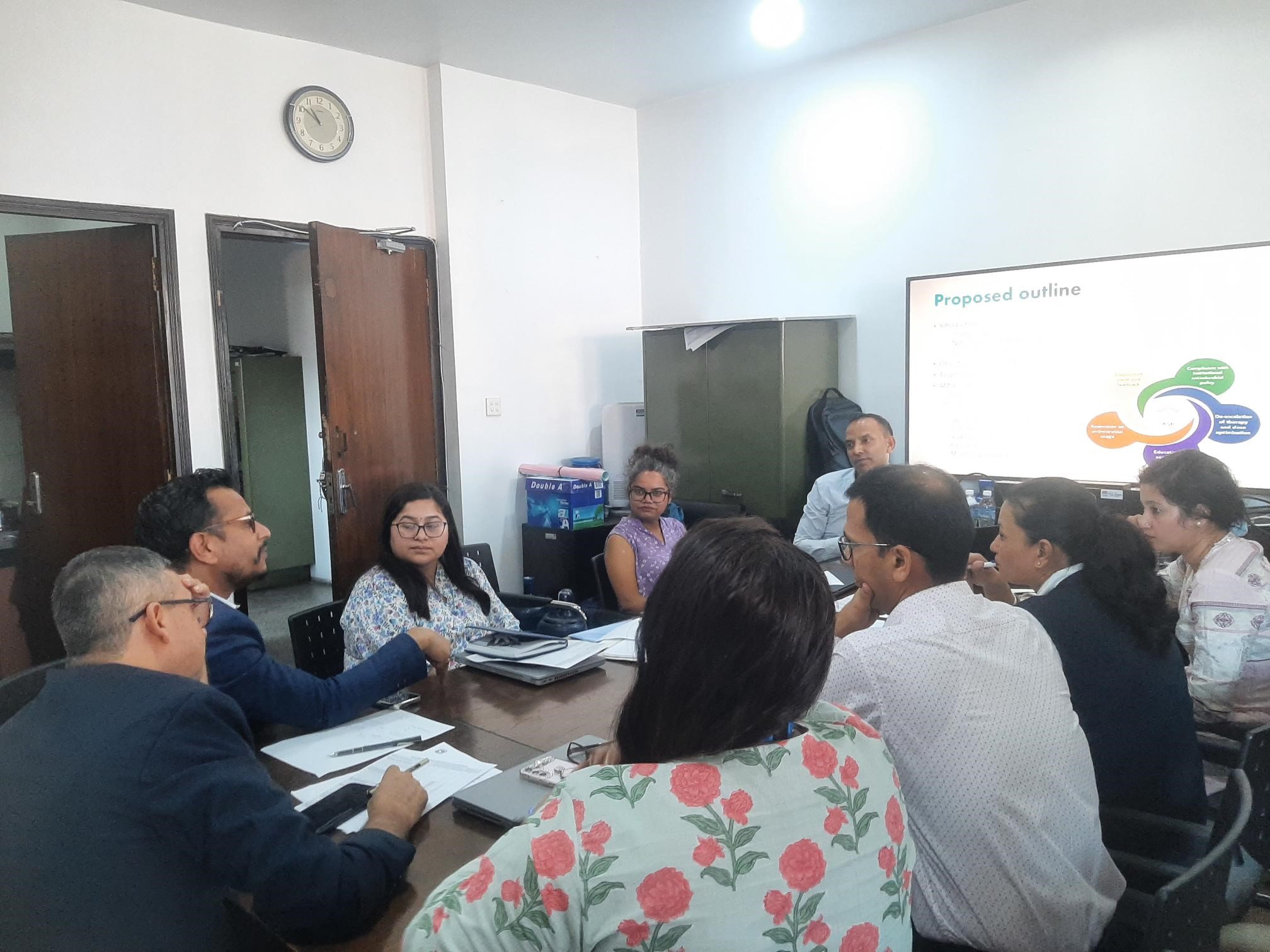Introduction
Globally, Antimicrobial Resistance (AMR) poses a profound threat to humanity, with consequences ranging from increased mortality and morbidity rates to the compromised effectiveness of healthcare interventions and beyond. Inappropriate use of antimicrobials across various sectors including human health, agriculture, and veterinary sector have accelerated the AMR. Nepal is facing a growing burden of AMR, which has drawn the attention of public health experts, stakeholders, and academics.
To help address this issue, the Ministry of Health and Population (MoHP), in collaboration with WHO Nepal, has tasked HERD International to draft the National Guideline for Antimicrobial Stewardship Program (AMSP) for healthcare facilities in Nepal. This guideline will provide a framework and evidence-based strategies to support effective planning and implementation of antimicrobial stewardship activities to promote the careful and rational use of antibiotics, antifungal, and antiviral medicines. As it is aimed ultimately for health facilities to use, the national guideline will also be tailored to local contexts.
Approach
Drafting the National Guideline for AMSP will involve a systematic and participatory approach. Relevant stakeholders, including federal, provincial, and local governments and development partners, will be engaged in order to ensure that the guideline aligns with national and sub-national policies and procedures and global standards. The guideline will be developed in line with WHO’s global guidance on AMSP and the Government of Nepal’s priorities as stated in the National Action Plan on AMR 2024-2028.
Key Steps
- Inception period: The first step involves introductory and inception meetings with representatives from QSRD, MoHP, WHO and other key government officials. This is an opportunity for all relevant stakeholders to gain clarity and consensus on objective, scope, and deliverables. These meetings will also support identification of potential risks and uncertainties, as well as planning for strategies to manage these risks. Following this, an inception report, carefully outlining the scope of work with timeline, deliverables, approaches, and methodologies to be employed, and overall strategy for project execution will be developed that will serve as a comprehensive guide.
- Desk review and consultations: The next step is a desk review focusing on the National Action Plan on AMR, WHO guidelines and toolkits on ASMP in health facilities, and existing AMSP guidelines from other countries to adapt lessons learned and best practices that could inform the National Guideline on AMSP. Consultations at health facility level will also be conducted to better understand the current landscape of antimicrobial stewardship in Nepal. This will result in a detailed map of key stakeholders to establish a technical working group for the development of the guideline and facilitate the multidisciplinary approach required for effective implementation of the AMSP.
- Drafting of the National Guideline: The technical working group will begin drafting a comprehensive National Guideline for AMSP in Healthcare Facilities that is tailored to the Nepali context in alignment with national priorities and WHO standards. This document will be bolstered by regular consultation with the QSRD and WHO for input, review, and feedback, which will support the finalization of the guideline.
- Workshop for finalization of the National Guideline: The final step involves coordinating with MoHP and WHO to plan and conduct workshops to disseminate the National Guideline on AMSP to relevant stakeholders. During these workshops, participants will provide their input and feedback, which will be incorporated into the guideline to ensure its alignment with stakeholder perspectives and priorities.
Associated Team Members
Abriti Arjyal
Research Manager - Qualitative and Multidisciplinary ScienceAbriti Arjyal
Research Manager - Qualitative and Multidisciplinary ScienceAbriti Arjyal has more than a decade of experience in the health system and social research, with specific expertise in implementation science and applied research. As a Research Manager in Qualitative and Multidisciplinary Science, she has led and contributed to several research projects as a co-investigator, thematic lead, or a member of the research team. and has established a network with national and international research experts. She has wide-ranging experience in the application of numerous research methods, including qualitative tools [...]
Learn moreSushil Chandra Baral
Managing DirectorDr. Sushil Chandra Baral is an experienced health and development expert with over 25 years of experience in research and development. Specializing in health systems, health policy, and planning at both national and international levels, Dr. Baral has played a pivotal role in communicable disease control, specifically Tuberculosis. He serves as a Managing Director at HERD International. In the past, he worked as a Strategic Advisor for the Nepal Health Sector Support Programme demonstrating expertise in program-based operational research and [...]
Learn moreGhanshyam Gautam
Lead - Health Economics, Systems and Social ProtectionGhanshyam Gautam
Lead - Health Economics, Systems and Social ProtectionAppointed as the lead of Strategy, Partnership and Business Department Dr. Ghanshyam Gautam is a Health Economist possessing more than 20 years of experience in health policy and systems reform, social protection, evidence-based planning and capacity development. His key areas of expertise include policy and strategic reform, health systems strengthening, health financing and universal health coverage, social protection, system and policy research. He currently holds the position of Lead- Health Economics, Systems and Social Protection at HERD International and has [...]
Learn morePratistha Dhakal
Research OfficerPratistha Dhakal is a committed public health professional and registered nurse, bringing over two years of clinical nursing experience and more than two and a half years of expertise in public health. She has contributed to strengthening health systems through her work at Nepal Health Sector Support Program-III and now leverages her extensive experience in her current role as a Research Officer at HERD International. She brings a diverse perspective of system thinking, gender, clinical practice and community development into [...]
Learn moreProject Location
Similar Projects
Gender and Equity within Antimicrobial Resistance (GEAR UP) is a Fleming Fund Regional Grant consortium led by the Liverpool School of ...
Understanding the policy environment, people’s perception and use, and co-creating intervention for labelling of SSBs to reduce ...
BACKGROUND Evidence has shown that antibiotic resistance (ABR) is a growing threat to public health in Nepal. This project proposes to ...
Introduction The climate crisis is a global health threat. Heatwaves, droughts, floods and landslides cause substantial morbidity and ...
Introduction The Pandemic Preparedness Toolkit (PPT) is a five-year project (2023 – 2028), funded by Wellcome, which aims to ...
Background The growing numbers of urban poor around the world face several health challenges including the double burden of ...
Background Antimicrobial resistance (AMR) is when microorganisms evolve mechanisms to survive the drugs designed to destroy them (WHO ...
Introduction The Participatory Engagement of City Communities Against Non-communicable Disease Risk in Bangladesh and Nepal (PECAN) ...
Innovation Fund is the scheme provisioned by CHORUS Research Project Consortium. The fund is targeted to early and mid-career ...
Introduction The KfW Development Bank has supported the cooperation framework between Nepal and Germany for over 20 years. This ...





